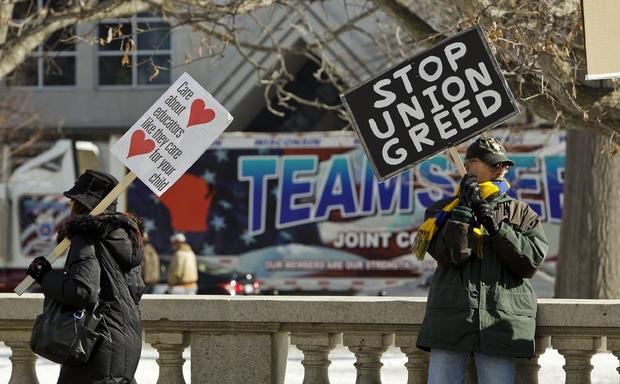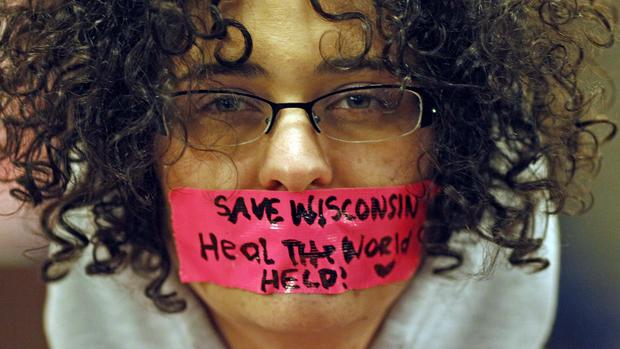As Wisconsin protests continue, national groups seek local support to recall Wisconsin lawmakers
Pressure is building for politicians in Wisconsin to resolve the ongoing dispute over union rights. But even after the matter is settled, some state lawmakers could be subject to the ire of their angry constituents -- who are being nudged along by passionate activists who work at a national level.
National organizations, both conservative and liberal, are considering leading recall movements against Wisconsin politicians in the wake of the highly-charged debate over Republican Gov. Scott Walker's so-called "budget repair bill." The legislation would, among other things, scale back public workers' benefits, as well as their collective bargaining rights.
Today, the liberal groups Progressive Change Campaign Committee and Democracy for America launched robocalls in the districts of five Republican state senators to determine whether voters are interested in pursuing recall efforts against their respective representatives.
The five targeted lawmakers are: Sens. Luther Olsen, Dale Schultz, Robert L. Cowles, Dan Kapanke, and state Senate President Mike Ellis. Three of those lawmakers -- Olsen, Cowles and Kapanke -- are immediately vulnerable. Under Wisconsin law, elected officials are vulnerable to a recall after one year in office.
Meanwhile, the American Patriot Recall Coalition, a conservative group founded in Utah in response to the events in Wisconsin, is in the process of gathering signatures to recall seven of the 14 Democratic Wisconsin senators who fled their state in protest of Walker's bill.
The group is targeting Democratic state Sens. Lena Taylor, Spencer Coggs, Mark Miller, Robert Wirch, Julie Lassa, Fred Risser and Dave Hansen.
Dan Baltes, the group's founder, said that problem was easily resolved. He told the Hotsheet he had "more volunteers than I knew what to do with" to get those signatures to the GAB. Once the GAB receives those corrected requests (the board told Baltes it has already received the request to recall Coggs), the group can officially start gathering petition signatures for a recall election.
In spite of his group's initial misstep, Baltes said he speaks with local leaders about his efforts all the time and has the support of the Germantown, Wisc., Tea Party. His organization's board includes members from several states.
"You really can't have any opposition or measured response unless it's also from a national coalition of people in the United States who are like-minded," he said. "Local organizations are best served to take the help that's offered to them."
Baltes contended that the American Patriot Recall Coalition is serving as a counter to national groups like the Democratic National Committee, which has facilitated rallies and other pro-union organizing efforts in Wisconsin. "On one side you have the DNC, progressives out of Chicago, socialists out of Chicago... of course it would be in their best interest if the opposition to them were local and fractured and small," he said.
Conservatives in Wisconsin have, in fact, received robust national support. Groups like the Newt Gingrich-backed American Solutions, the Koch-backed Americans for Prosperity, the Republican Governors Association, and several potential GOP 2012 presidential nominees are all backing Wisconsin Republicans.
Still, the groups bring with them the resources and expertise of nationwide movements.
Meanwhile, some truly local recall movements are also underway. Appleton, Wisc. resident Michael Brown, a Wisconsin native, started the organization United Wisconsin to recall Gov. Walker and Lt. Gov. Rebecca Kleefisch. Brown is building a database of petitioners who support the recall effort. He's so far gathered more than 47,000 signatures and plans to put that database to use once Walker is vulnerable to a recall in November.
"United Wisconsin started as a little snowball at the top of the hill here, and it's getting bigger," Brown told the Hotsheet.
As a self-identified independent, Brown was hesitant to associate his efforts with those of PCCC or DFA, but he said, "Any awareness on what Mr. Walker is proposing, that keeps it on the forefront -- that's important." He praised DFA founder Howard Dean, the former Vermont governor, as a smart politician.
Brown said he believed most Wisconsinites would have a problem with the American Patriot Recall Coalition and other groups based outside of the state "interfering" in Wisconsin politics.
"There's a lot to be said for the people's voice here," he said. "It's up to me and the people of Wisconsin to do an excellent job on this."


